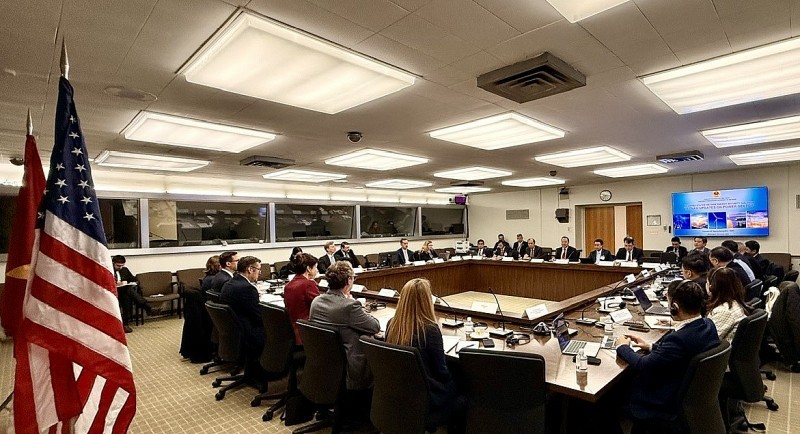Vietnam - US Energy Security Dialogue (5th) in Washington
16:00 | 22/11/2024
This annual event is held alternately between the Ministry of Industry and Trade of Vietnam and the US Department of State (since 2018).
The 2024 Vietnam - US Energy Security Dialogue is an event that both sides are looking forward to - as Vietnam and the US have issued many new mechanisms and policies in the energy sector and are actively implementing them.
In particular, this dialogue was held right after the US side had just finished the 2024 Presidential election and it is predicted that the new administration will continue to have many fluctuations and policy changes in energy development in this country.
At the dialogue (as usual), representatives of the two sides have presented key issues in bilateral energy cooperation including:
1. Update on energy policies, institutional reforms, integration of renewable energy, energy storage, emission reduction in the electricity sector, and investment in energy infrastructure.
2. Detailed discussion of clean energy technologies such as: Hydrogen, battery storage, carbon capture, utilization and storage (CCUS).
3. The role of liquefied natural gas (LNG).
4. Urgent plans to accelerate the energy transition to achieve net zero emissions by 2050.
5. Enhancing the role of women in the energy sector.
 |
| Vietnam - US Energy Security Dialogue (5th time) in Washington, DC, USA. |
The dialogue acknowledged and welcomed the participation of Vietnamese and US enterprises in the energy sector.
At the opening session, Deputy Minister of Industry and Trade of Vietnam Nguyen Hoang Long emphasized: “Currently, the issue of energy transition is of special concern and is considered a key issue in the contents of the At the opening session, Deputy Minister of Industry and Trade of Vietnam Nguyen Hoang Long emphasized: “Currently, the issue of energy transition is of special concern and is considered a key issue in the contents of COP26 held in Glasgow, UK in November 2021. Vietnam is a country that uses quite a lot of fossil energy for power generation.
Since COP 26, and joining the Just Energy Transition Partnership (JETP), the Vietnamese Government has issued two important plans:
- National energy planning for the period 2021-2030, vision to 2050.
- National power development planning for the period 2021-2030, vision to 2050
Most recently, the Ministry of Industry and Trade has submitted to the Government the Plan to implement the VIII power development planning, Decree No. 80/ND-CP regulating the mechanism for direct electricity purchase between renewable energy power generation units and large electricity users and Decree No. 135 regulating the mechanism and policies to encourage the development of self-produced and self-consumed rooftop solar power.
.The issuance of many important mechanisms and policies in the energy sector, especially the electricity sector as mentioned above, we have received much attention from international energy organizations and partner countries, including the United States". In addition, Deputy Minister Nguyen Hoang Long also mentioned and shared the plan and roadmap to promote Vietnam's energy transition in the following years, aiming to achieve net zero emissions target by 2050. At the same time, the role of international partners, international organizations, including the government, and US companies in supporting Vietnam in implementing the JETP commitment was emphasized.
In addition, the US side organized a roundtable discussion on the Clean Energy Demand Initiative (CEDI) chaired by the Clean Energy Buyers Association (CEBA).
The businesses focused on discussing how Vietnam can encourage private sector investment through increasing clean energy supply and private sector commitments
The goal of CEDI is to create an open platform for the Government, as well as the private sector, to develop effective policies and regulations to:
1. Promote competitive markets in terms of cost and efficiency.
2. Facilitate priority investments in grid infrastructure and clean energy.
3. Support companies to purchase/access clean energy supplies, in line with zero-carbon commitments.
The above objectives play a core role in unlocking private investment in the Vietnamese market.
Within the framework of the dialogue, the Vietnamese delegation participated in bilateral meetings and exchanges with US partners including the US-ASEAN Business Community (USABC), and the US Agency for International Development (USAID).
Accordingly, the Parties actively exchanged and discussed important contents such as:
1. Plans of US companies in implementing commitments to support clean energy development in Vietnam.
2. Sharing about advanced clean energy technology solutions (offshore wind power, nuclear power, hydrogen power, electric vehicles, battery storage, and the role of LNG).
3. Difficulties, challenges, and solutions to unlock private sector participation in investment in the energy sector in the Vietnamese market, as well as the rol of banks and financial institutions in supporting Vietnam in implementing the JETP commitment in particular and the energy transition goal in general.
The working group of the Ministry of Industry and Trade of Vietnam also had a meeting and worked separately with large enterprises of USABC who are interested and looking to invest in Vietnam as well as BP, Pacifio Energy, Cheniere, and Wealth Power.
